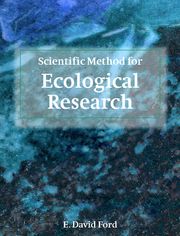Book contents
- Frontmatter
- Contents
- Preface
- Acknowledgements
- 1 Component processes of ecological research
- Introduction to Section I: Developing an analytical framework
- Introduction to Section II: Making a synthesis for scientific inference
- Introduction to Section III: Working in the research community
- Introduction to Section IV: Defining a methodology for ecological research
- Appendix: Suggestions for instructors
- References
- Glossary
- Author index
- Subject index
1 - Component processes of ecological research
Published online by Cambridge University Press: 08 January 2010
- Frontmatter
- Contents
- Preface
- Acknowledgements
- 1 Component processes of ecological research
- Introduction to Section I: Developing an analytical framework
- Introduction to Section II: Making a synthesis for scientific inference
- Introduction to Section III: Working in the research community
- Introduction to Section IV: Defining a methodology for ecological research
- Appendix: Suggestions for instructors
- References
- Glossary
- Author index
- Subject index
Summary
Summary
Ecologists starting research for the first time have many questions about the scientific method. This chapter gives examples of these questions and classifies them into three groups: those concerned with the analytical process of research; those concerned with the special problems of ecology, particularly how we synthesize knowledge and develop ecological theory; and those concerned with the social aspects of research. The chapter describes how these groups of questions will be answered in successive sections.
section I
Developing an analytical framework. Alogical framework is required for research. Assumptions must be clearly stated as axioms, and questions must be formed as postulates, i.e., statements that can be investigated and then classified as true or false, or assigned a probability. This framework is the foundation for the research you do and the basis for making scientific inference.
section II
Making a synthesis for scientific inference. Ecological and environmental research present special problems of scientific methodology. Ecological systems are open to multiple influences and vary in ways that limit the types of investigation used and the generality of scientific inference that can be made. Some important concepts have to be defined by a theory.
section III
Working in the research community. Social interactions influence the scientific method. Science is, in part, a social activity that can influence how, and what, problems are researched.
section IV
Progressive Synthesis is defined as a methodology for developing ecological theories and examining how coherent they are as explanations.
A distinction is drawn between what scientists do in research (the progress they make) and how it should be done (the processes that should be used).
- Type
- Chapter
- Information
- Scientific Method for Ecological Research , pp. 1 - 14Publisher: Cambridge University PressPrint publication year: 2000



